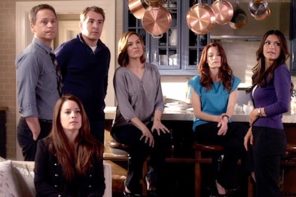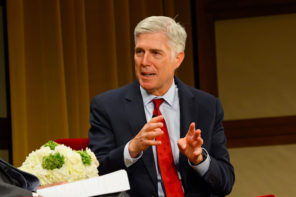A Coeur d’Alene, Idaho couple, Donald and Evelyn Knapp, are the new cause celebre of the Christian right, symbols of a supposedly strong-arm government forcing religious opponents of marriage equality to participate in and sanction same-sex weddings.
But the zeal with which the Knapps’ lawyers are pursuing their case has led some valuable religious right allies on religious exemptions to raise questions about the case: libertarians.
By way of background, read Daniel Silliman’s piece here at RD on the case:
[W]ith the assistance of the Alliance Defending Freedom, the Knapps sued the city of Coeur d’Alene to keep it from enforcing an anti-discrimination ordinance, passed in 2013, prohibiting discrimination based on sexual orientation in housing, employment and “public accommodation.” It’s not clear that “public accommodation” applies to for-profit wedding chapels, but following a federal court ruling that overturned the state’s ban on same-sex marriages, Coeur d’Alene’s attorney said it might.
Zack Ford at Think Progress reported that the Knapps recently changed their business model so they would fall within the religious exemption to the anti-discrimination law, with a legal document “which enshrines all of the religious values offered in the complaint as part of the business. They similarly added a new Employee Policy and Customer Agreement stipulating that the Hitching Post will only perform unions ‘between one biological male and one biological female.’” Additionally, while the Hitching Post used to offer “wedding ceremonies of other faiths,” as Jeremy Hooper documented, the website was recently changed to offer only “a traditional Christian wedding ceremony.”
Sarah Jones of Americans United for the Separation of Church and State notes the city has not threatened the Knapps with arrest or imprisonment, adding “Americans United has been clear all along: No church can be compelled to offer religious services to same-sex couples. The First Amendment protects against that.” But because the Hitching Post is a for-profit business, it is not entitled to the religious exemption granted under the local anti-discrimination law.
Libertarians, while either agnostic on or for marriage equality, have long taken the religious conservatives’ side on exemptions for clergy and other religious actors from being required to perform or participate in same-sex wedding ceremonies. But the overzealousness of the Knapps’ legal team has led some to question the wisdom and utility of the case.
Andrew Sullivan, noting, based on Hooper’s reporting that the business has long been willing to perform non-Christian ceremonies, argues that the Knapps are blurring the lines on religious exemptions, and “this case looks like a deliberate provocation.”
Walter Olson of the Cato Institute’s Overlawyered blog, writes that he has “learned through hard experience not to run with stories from ADF” without “seeking additional corroboration.” He’s sympathetic to the Knapps’ cause, but not to the way they have presented their case:
While I hope the Knapps succeed in establishing their exemption from this law, I am still shaking my head at the ADF’s framing efforts, which via Starnes set off a predictable panic about dangers to religious liberty (see also, last week, on the Houston pastors subpoena). In this instance, those efforts amount to something very akin to hiding the ball, including (as cited by Sullivan) the quiet legal revamping of the business onto a religious basis in recent weeks and the silent removal of extensive language on its website that until earlier this month had promoted the chapel as a venue for civil, non-religious wedding ceremonies.
Now, the Knapps are free (or should be, in my view) to change their establishment’s business plan overnight to one that welcomes only ceremonies consistent with Foursquare Evangelical beliefs. But shouldn’t their lawyers be upfront that this is what’s going on? . . . .
Let’s be blunt. ADF, which was involved in helping the Knapps revamp their enterprise onto a religious basis, is by the omissions in its narrative encouraging alarmed sympathizers to misread the situation.
Olson notes in an update that the city of Coeur d’Alene maintains that only if the Hitching Post is organized as a non-profit will it be entitled to the religious exemption under the anti-discrimination law. Even those who support an exemption (as Olson does), if not ADF’s framing, maintain that the for-profit/non-profit distinction should not be a bar to the exemption, citing the state’s Religious Freedom Restoration Act. In other words, like in the Hobby Lobby case, even for-profit business run by religious people should be entitled to an exemption from this law. (How that will play out in court remains to be seen.)
The libertarians are on the Knapps’ side; they just object to the deceptive and breathless framing of their lawyers. It will be interesting to see if the libertarian lament has any impact on the framing of future cases.




